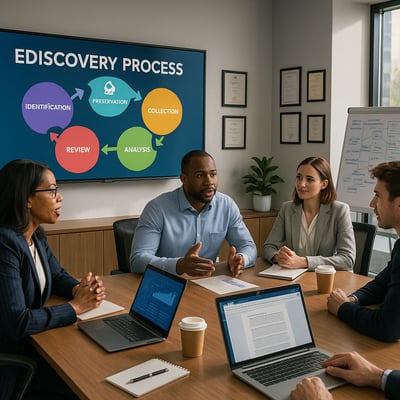" Cut Through the Digital Clutter: Why eDiscovery Is No Longer Optional \n In today’s legal...

The first 8-inch floppy disk, released in 1971, could store ~ 80 kilobytes of data. At the time, it was hard to imagine needing so much space. The iPhone 14 Pro comes with 256GB of data. A 3.3 million percent increase. Today we are generating more data than was conceivable only a few decades ago.
We are generating and storing more information than ever. According to the American Bar Association, “90% of data humans have amassed has been collected in the past two years.” And we’re only creating more each day.
Not only is this volume of data almost unfathomable, from a litigation standpoint, it is also discoverable. As the ways in which we communicate continue to evolve, so must the way we manage and store this information. In our interconnected, and ever-evolving, world what considerations should we take when it comes to eDiscovery?
Or maybe you’re a Teams shop, either way you are likely communicating across at least one collaboration platform and even more likely, those collaboration solutions are cloud-based. This presents challenges when it comes to crafting a reasonable process for legal holds. A second, equally daunting challenge, cybersecurity for a vast amount of information.
How do legal teams preserve enough data from a legal hold standpoint but not so much that a breach would be devastating? The answer may be in the tools themselves. Many collaboration platforms have tools or settings that can aid in legal holds. Connecting with IT teams to understand the tools capabilities can go a long way to proactively preserve information.
It is important to note that these tools will not be a complete solution but can be an important step in the process. Understanding where and how information is exchanged is the key to a comprehensive strategy, beyond email and messaging platforms consider spaces like Basecamp and SharePoint.
Shredding documents has a pervasive enough history that everyone from The Wolf of Wall Street to Brooklyn Nine-Nine has shredding scenes related to questionable activity. Today, programs like WhatsApp and Signal can not only encrypt communications for security, they can automatically erase communications, shredding the communication trail.
With increasing litigation surrounding fintech, non-fungible tokens, and blockchain technology increase, courts are having to examine how to preserve information in novel ways. However, while the formats may be new the concepts remain constant. In fact, the SEC has levied billions of dollars in fines to organizations for unauthorized use of messaging apps that erase or encrypt communications as they cannot be properly monitored or maintained for compliance purposes.
While the technologies themselves are changing, quickly, the responsibility of legal departments and the interest courts have in information preservation remain constant. As technology evolves, courts are also evolving in their consideration of data protection as we’ve seen in cases like Drips Holdings, LLC v. Teledrip LLC, where courts have levied sanctions for improper record retention.
Technology is more ingrained in our lives than ever before and with every new advancement we are both generating more information and better cataloging what already exists. When it comes to litigation, information is a vital part of the process, having access to accurate and complete records is essential.
For in-house legal teams having a thorough and proactive approach to data governance will not only set them up for success in litigation, it will also likely mean avoiding regulatory compliance sanctions. That means understanding data inputs, outputs, storage and retention options.

" Cut Through the Digital Clutter: Why eDiscovery Is No Longer Optional \n In today’s legal...



Every week, the Array team reviews the latest news and analysis about the evolving field of...